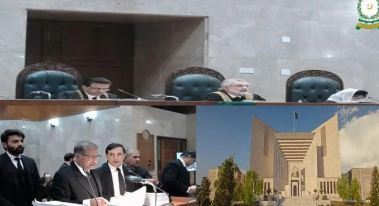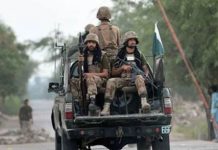ISLAMABAD: The Supreme Court has reserved its verdict on the Election Commission of Pakistan’s (ECP) petition against the Peshawar High Court’s (PHC) January 10 order that restored the Pakistan Tehreek-e-Insaf’s (PTI) bat electoral symbol.
A three-member bench — headed by Chief Justice of Pakistan (CJP) Qazi Faez Isa and comprising Justice Muhammad Ali Mazhar and Justice Musarrat Hilali — is set to announce the verdict shortly after a day-long hearing.
The election commission had on December 22 barred the PTI party from keeping its ‘bat’ symbol for the upcoming February elections, citing irregularities in their internal polls that did not comply with the party’s own constitution and election laws.
Following the ECP’s decision to revoke their symbol, the PTI challenged it in the PHC. A single-member judge granted temporary relief, reinstated the bat symbol, and referred the case to a larger bench for a hearing on January 9.
Then, on December 30, the polling body challenged the PHC’s jurisdiction over the matter. However, in a dramatic turn of events, the PHC reversed its earlier decision and upheld the ECP’s order.
Facing the prospect of losing its iconic cricket bat symbol for the upcoming elections, the PTI took its fight to the highest court in the land — the Supreme Court. However, in a strategic move, they later withdrew their appeal, hoping for a favourable outcome from the PHC.
And the PTI did get what it wanted. The PHC on Wednesday declared the commission’s order “illegal, without any lawful authority and of no legal effect”. However, the ECP challenged it decision in the country’s top court on Thursday.
Subsequently, the PTI also filed a plea in the PHC against Election Commissioner Sikandar Sultan Raja and other ECP members for not following up on the PHC’s order.
The hearing
During the hearing, the apex court raised questions on PTI seeking a level playing field, particularly in light of reservations communicated by its own members about the lack of one in the party.
“You ask for a level playing field, you must also give one to your members,” Justice Muhammad Ali Mazhar remarked.
At the outset of the hearing, PTI lawyers Barrister Ali Zafar and Hamid Khan appeared before the court, while Makhdoom Ali Khan represent the ECP in the case.
Barrister Zafar informed the court that it is the last date for allotment of final lists and election symbols, hinting the bench to expedite the case.
Addressing Barrister Zafar Justice Mazhar remarked that the ECP didn’t take action on its own but sprung to action after receiving complaints on PTI’s intra-party polls.
He also asked if the party’s polls were transparent and whether it was clear who could or could not contest the election.
While responding to Justice Mazhar’s comments, Zafar said: “Election Commission has not identified any such irregularity. I will answer all questions with documents.”
Earlier, CJP Isa remarked that it isn’t enough to level allegations at the ECP on social media or media. He said that the electoral body informed the court about sending a show-cause notice to PTI regarding the intra-party polls in the past, while the party was still in the government, but it had then failed to conduct the polls citing different reasons.
“The Election Commission took notice of PTI when it was in government,” he remarked.
“Was the Election Commission an independent constitutional body in your government, which has now become subordinate to someone?” he asked the PTI counsel.
As Justice Mazhar asked about ECP’s authority to investigate intra-party elections, Barrister Zafar apprised the that the Constitution doesn’t allow the electoral authority to review intra-party polls and that the electoral symbol cannot be withheld due to these elections.
“Depriving a political party of its election symbol on the basis of intra-party elections is a violation of Article 17-2,” Barrister Zafar added, accusing the ECP of discriminating against the PTI.
He further argued that the electoral body has apparently “acted maliciously” by taking away the bat symbol. “The Election Commission is not a court of law that can give a fair trial.”
The lawyer claimed no PTI member has challenged the intra-party elections.
“Even if the polls were challenged, it becomes a civil court matter. The Election Commission does not have the suo motu powers.”
If the ECP orders, he added, are arbitrary and contrary to facts, the court possesses the power of judicial review, responding to the question of jurisdiction of the court.
Detailing the PTI’s previous intra-party elections, the lawyer said that the party held its first election on June 8, 2022. The ECP, he added, termed those elections wrong and ordered a re-election in 20 days on October 23.
Barrister Zafar argued that the ECP’s orders came after the SC verdict on conducting polls on February 8, 2024.
Referring to petitioners against the PTI’s intra-party polls, Barrister Zafar argued that his party’s basic position is that the petitioners are not members.
He further stated that the ECP didn’t mention any irregularity in its order pertaining to the electoral symbol. “The reasons given by the Election Commission for the decision are strange. It termed the elections valid and declared the appointment of the chief election commissioner invalid.”
ECP said, he added, that the appointment is not valid, so they will not recognise the election nor mark it.
The PTI lawyer reminded the court about ECP lawyer’s argument on democracy within the party, responding to which CJP Isa remarked that democracy should exist within political parties along with the country. “The main question is about democracy and not about the complete implementation of the party’s Constitution. It should at least appear that polls took place.”
The CJP, when addressing the PTI lawyer, said that one of the petitioners challenging the party’s intra-party polls is Akbar S Babar and he possessed PTI’s membership. “It is not enough to simply say that the petitioners were not party members. You should show if Akbar S Babar resigned or went to another party.”
The chief justice also asked the PTI lawyer to prove its claim that the ECP is being pressurised by the establishment. “Why will the establishment pressurise ECP?”
He added that the court cannot control constitutional institutions. “When you allege malice, state where the malice is,” CJP Isa remarked.
Comparing PTI’s case with that of other parties in the past who faced opposition by other political groups, the chief justice said that the opponents of Imran Khan’s party are not in the government.
“Nowadays everyone uses the word establishment, the real name is army. We should speak openly and completely,” CJP Isa remarked. Following CJP’s remarks, the PTI withdrew its allegation of malice against the ECP.
The CJP told the PTI lawyer to avoid delving into technicalities of the polls and inform the court whether the intra-party elections provided equal opportunity to all members or not.
He told the lawyer that Akbar S Babar should have been allowed to contest polls and that he would have lost the elections anyway without any support.
The chief justice asked Barrister Zafar why the 14 members of the party were not allowed to contest intra-party polls. Responding to the CJP, he said that they were, in fact, permitted to contest elections.
Meanwhile, Justice Hilali, during her remarks, said that the PTI will get the certificate when its intra-party elections are held as per its Constitution.
Barrister Zafar during the hearing said: “We are also ready to accept any other electoral symbol as the party can only contest elections if it has a symbol.”
At this, the CJP asked the ECP’s lawyer if the Commission was preventing them from contesting the elections.
Makhdoom Ali responded that he had issued no such orders. He also said that the parties can contest polls without a symbol.

















